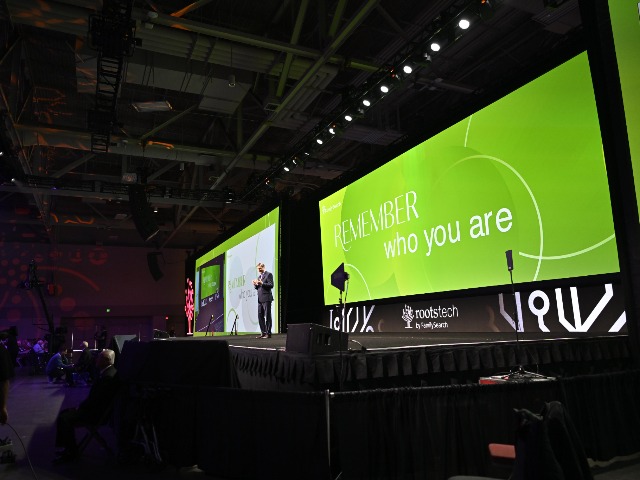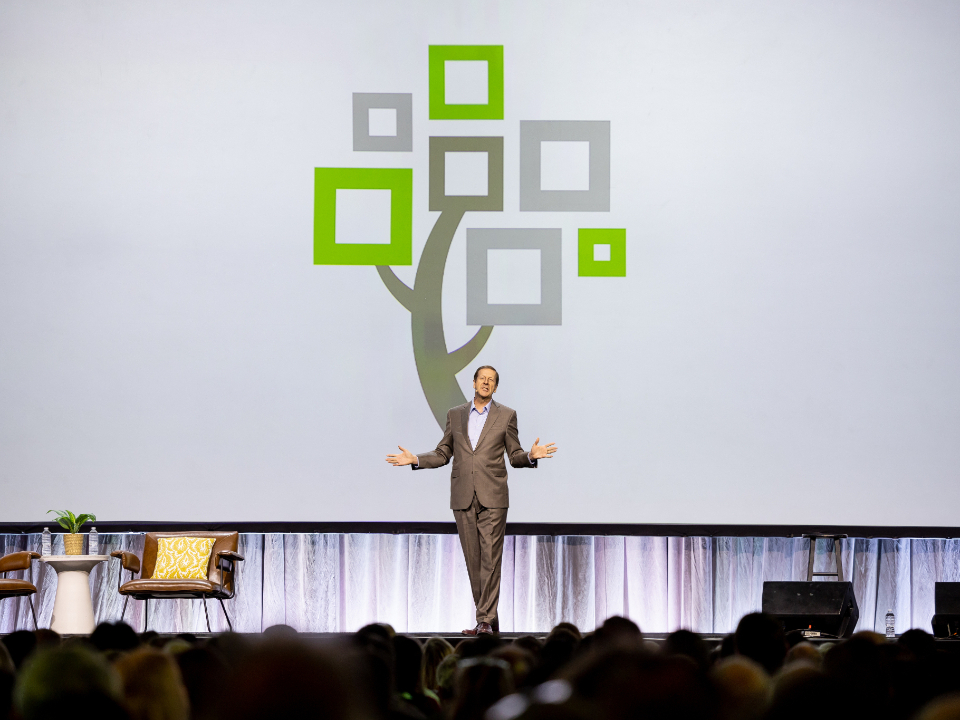
rootstech-highlights-1.jpg
FamilySearch CEO Steve Rockwood speaks at the 2023 RootsTech conference at the Salt Palace in Salt Lake City on Thursday, March 2, 2023. Photo by Spenser Heaps, courtesy of Church News.Copyright 2024 Deseret News Publishing Company.This story appears here courtesy of TheChurchNews.com. It is not for use by other media.
By Trent Toone, Church News
Nearly a month after the conclusion of RootsTech 2024, FamilySearch President and CEO Steve Rockwood summarized the three-day global family history conference in one word — “tremendous.”
More than 16,000 people attended the in-person event in Salt Lake City and close to 4 million from over 230 countries and territories worldwide participated online.
“The value and the model of RootsTech continues to prove itself, especially since the pandemic,” Rockwood said. “It is primarily an online, global event that provides individuals — from enthusiastic genealogists and family historians to those who want to participate in the celebration of family in general — with classes, keynotes, forums, activities and experiences that are universal and truly bless peoples’ lives. If we build it, they do come. We are more excited than ever to let people know these experiences are available to them.”
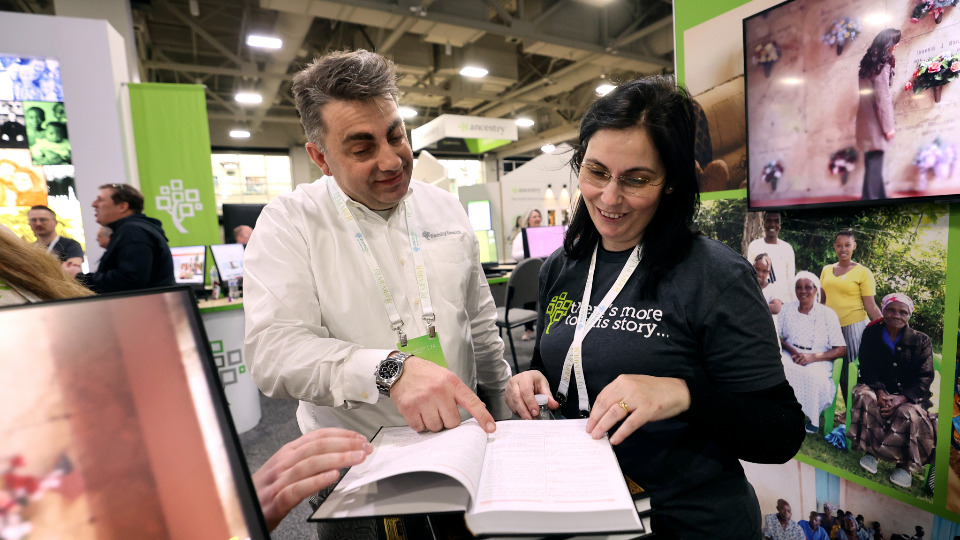
The best part, Rockwood said, is that RootsTech isn’t over. Individuals can continue to discover and learn by going to RootsTech.org to consume on-demand content for the next 12 months, with additional content that will be released throughout the year. Individuals can also continue to connect with cousins using the Relatives at RootsTech feature on the FamilySearch app through March 31.
“There is just so much for people to go in, learn and understand,” he said. “My favorite words that I heard, whether online or in person, were ‘I had no idea,’ and we heard a lot of ‘I had no ideas’ this year, with people learning new methodologies or how to engage again.”
Rockwood, along with Elder Kevin S. Hamilton, a General Authority Seventy and executive director of the Family History Department, and others shared key learnings, highlights and thoughts on the 2024 event and the future RootsTech conferences moving forward.
‘The Lord’s Work Is Moving Forward’
Three significant things are working together simultaneously to accelerate temple and family history work, Elder Hamilton said during the conference.
First, millions of people worldwide — not of the Latter-day Saint faith — are adding the majority of names to build family trees on familysearch.org, which Church members can then take to the temple to perform ordinances.
“That has been staggering to watch,” he said.
The Church is also collaborating with archives, organizations and volunteers globally at an increasing pace to scan, digitize and publish more previously unavailable collections.

Second, technological advancements are making it possible to analyze, organize and prepare more records in less time.
In recent decades, first came the internet, followed by mobile technology which allowed people to carry the FamilySearch app and an individual’s family history in his or her pocket. DNA testing then opened new doors and interest as it showed people where they came from and connected some to family members they didn’t know. Artificial intelligence is the latest advancement to help genealogists break through the so-called brick walls.
“At that very moment it is needed, the Lord provides this data or technology to handle it,” Elder Hamilton said. “Generative AI is a good example. We are doing things today that we couldn’t have done two years ago, and two years from now, we will be doing things we couldn’t do today.”
The third force at work is the unprecedented rate of building temples. The Church has 335 temples that are dedicated, under construction or in planning as of the end of 2023. Elder Hamilton said President Russell M. Nelson has taught many times that temples are nourished with names. Without genealogies and the names of kindred dead, temple ordinances could only be performed for the living.
“As temples get closer and closer to the people, you need proxy names. Otherwise, what will you do when you go to the temple?” Elder Hamilton said.
Those three elements coming together — more records and names provided by non-members, advanced technology and more temples — are hastening the Lord’s work.
“With all the complex problems and challenges in the world, it’s nice to see the Lord’s work is moving forward in spite of everything. This is a good time to be alive and the Lord is in charge. He’s got this,” Elder Hamilton said. “So go forward with faith and we will do the best we can.”
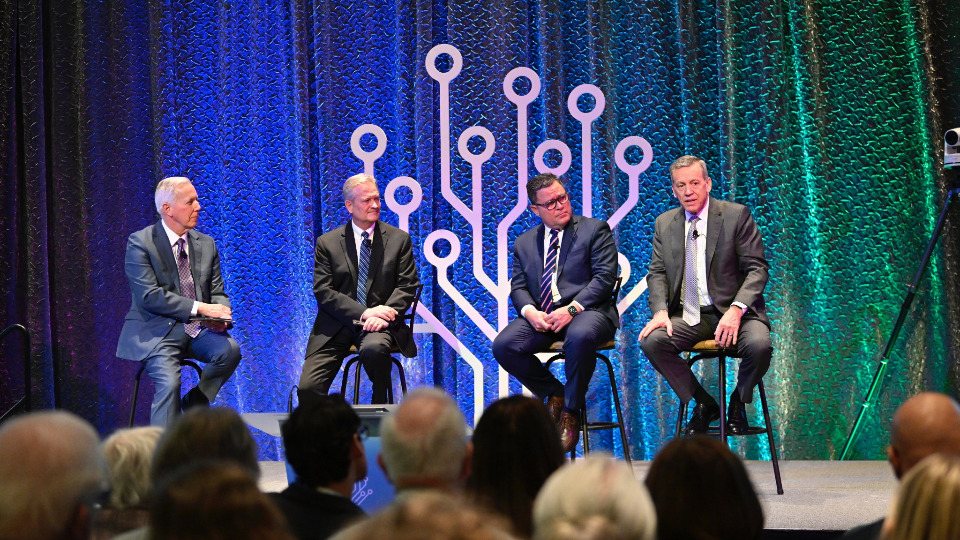
Rockwood cited one example of temple and family history work hastening in Italy, where FamilySearch has had measured success for years and years.
“The Rome Italy Temple gets announced, and within a few years, our single-largest project is throughout Italy,” he said. “In the coming year, we will be able to provide to Church members and those not of our faith the stories they have been looking for of their Italian ancestry. We’ve had the same in other parts of the world.”
Rockwood continued: “The Lord’s hand continues to be in this because there are so many moving parts, so many logistics and experiences. We’re trying to create one-on-one experiences for those four million people and the Lord really blessed us this year. I would say this was by far our smoothest RootsTech ever.”
Key Learnings
Along with knowing RootsTech can cater to everyone from the enthusiasts and the beginners, Rockwood said organizers were pleased with efforts to personalize the RootsTech experience for different ethnicities, languages and cultures in various parts of the world.
Individuals referred to as “global emcees” who speak a foreign language were able to act as sideline reporters at the three-day conference in Utah and provide a more customized experience for people following the family history conference online. Live interpretation was offered for main sessions in 11 languages while some content online was provided in more than 40 languages.

Rockwood also acknowledged a universal spiritual feeling that accompanied the conference.
“No matter what your religion is, or not, there is a spiritual experience [in family history work],” he said. “It goes beyond an emotional experience to become a spiritual experience as they discover who they are, where they come from and when they connect with other people. I just love that.”
Rockwood encouraged ward councils and Latter-day Saints who have not yet watched the 2024 Temple and Family History Leadership Instruction to make it a priority.
Generative AI
Rockwood said FamilySearch sees an “incredible future” for the use of generative artificial intelligence in boosting genealogical work.
Generative AI will help the human family tree to expand in new ways, said Jen Allen, director of RootsTech.
“We’re going to see that artificial intelligence come in and help us [answer] the really hard questions or [discover] the records that were destroyed or are really hard to read,” Allen said during the conference. “That computer is getting in there and figuring it out for us. It’s going to start with those brick walls, those areas where it’s been really hard for us to penetrate. We’re going to see that human tree grow because we are able to find more people.”
Two weeks after RootsTech, on March 13, Elder Gerrit W. Gong of the Quorum of the Twelve Apostles said with the increasing use and availability of artificial intelligence, Church leaders are evaluating how to best use AI as a tool in support of the ongoing Restoration. He offered some guiding principles on using this technology.
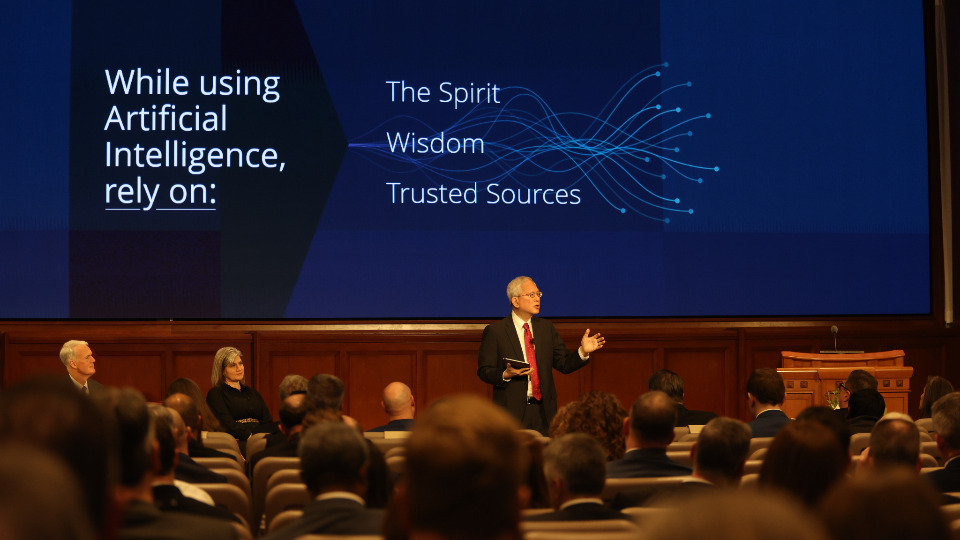
“Throughout the ongoing Restoration of the gospel of Jesus Christ, emergent technologies — including in construction, communication and transportation — have allowed this great work to reach out and touch every nation, kindred, tongue and people,” Elder Gong said in a presentation to thousands of Church employees worldwide.
Resources for how to use AI for family history experiences are available at RootsTech.org.
Thoughts and Learnings from RootsTech
The good happening worldwide in regards to temple and family history is the fulfillment of words spoken by Elder Richard G. Scott of the Quorum of the Twelve Apostles at the first RootsTech conference in 2011 — that the Lord would bring together people with “brilliant minds” and “sensitive hearts” to make this possible, said Elder Jorge M. Alvarado, a General Authority Seventy and an assistant executive director of the Church’s Family History Department. It’s happening.
“It’s great to see the connection that we are making with so many people that probably don’t understand the reason, but the main reason is to unite the family of God together,” he said. “One of the things that gets me so excited is our ambitious goal to build together with the world the family tree of humanity.”

Elder Allan F. Packer, an emeritus General Authority Seventy who previously served as the executive director of the Family History Department, attended the conference with his wife, Sister Terri Packer. Having been involved with the development of RootsTech from its inception, Elder Packer was grateful to see the growth, technological innovations and involvement of so many young people.
“It’s exciting. I think we’re just at the tip of the iceberg,” he said. “I think the Lord moves us to where we need to be if we are listening.”
Doreen Brough, a Latter-day Saint from Garland, Utah, said attending RootsTech has strengthened her faith and increased her love for her family.
“Learning the new technology to be able to find more names to share with my family and encourage them to be in the temple with me — doing our own family history work — has been the thrill of a lifetime and the greatest blessing. RootsTech gives you that extra motivation.”

Emmy Eaton, a 10-year-old from Idaho Falls, Idaho, attended RootsTech for the first time with her father, Nate Eaton. She was impressed by what she saw and wished she could have stayed longer.
“I have always been excited about [temple and family history work], but now being at RootsTech I am even more excited,” she said.
RootsTech 2025
The dates for RootsTech 2025 — March 6-8 — were announced at the conclusion of the conference.
The goal for future events is not to chase after greater numbers; the objective is to make RootsTech the premiere, must-attend event of its kind, Rockwood said.
“As more and more people discover this, what we are really looking for is for them to share it. We want them to engage longer,” he said. “The real win will be when people say, ‘You have got to go to RootsTech because it’s fun, it’s engaging, they always have a great show and I always learn something new.’ We’re going to make it the best of the best for the enthusiasts and the best of the best for everyone else.”

Copyright 2024 Deseret News Publishing Company.
